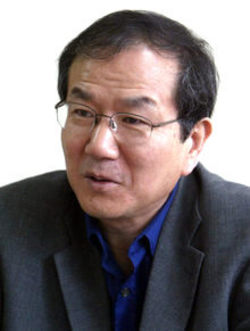Posted on : Jul.5,2006 12:53 KST
Modified on : Jul.7,2006 19:31 KST
 |
|
Hong Se-hwa, Public Editor
|
Hong Se-hwa, Public Editor
South Korea is a prime example of a country where politics often spin out of control when the people ignore socio-economic affairs that directly impact their daily life. The last National Assembly session was no exception. Politicians, whether they were from the ruling or main opposition party, were bent on fighting over hollow issues. They seemed to intentionally distance themselves from the issues truly related to people's livelihood. Discussion on anti-speculation measures were put on the back burner. While the main opposition Grand National Party (GNP) pushed through a revision of laws related to maintaining transparency in private school finances, the ruling Uri Party failed to provide any alternatives. There has been little differences between GNP and Uri on the policy proposed over many pending issues, ranging from the dispatch of troops to Iraq and the rights of contract and part-time workers to the ongoing free trade talks with the United States.
The GNP, through repeated scandals, makes Uri seem like a true reformist party in comparison. Conservative media such as the Chosun and Dong-a Ilbo have ended up consolidating this illusion through their daily sharp-tongued criticism of the ruling party. Unfortunately, this illusion has started to affect even the Hankyoreh. In the eyes of the people, however, the Uri Party is no different from the GNP and the conservative media.
Though the Hankyoreh has been critical of the ruling party and the government for their policies related to the troop dispatch to Iraq, the Saemangeum reclamation, irregular workers’ rights, and the free trade talks with Washington, it is, to its chagrin, being viewed as their close aide. The Hankyoreh itself is not free from taking responsibility for ignoring those who seek to improve political awareness among ordinary people.
After the collapse of socialism, it is a well-known fact that traditional left- and right-wing political parties in western Europe moved closer to the center. In a bipartisan system where conservative and liberal poles previously dominated, the result was a more marginal difference in political stances. Politicians thought they could win broader support if they did not reveal their ideological colors. The "Third Way" of Britain and "Neue Mitte" of Germany meant that the countries had accepted this new liberalism in the midst of globalization. But these politicians did not reveal outright their intention of moving toward the center. Having said that, President Roh's remarks that he represents a "left-wing-new-liberalism" could backfire due to his frankness regarding his intentions.
But his frankness remains optional, just as he chose not to apologize in the aftermath of the debacle surrounding the defamed stem cell scientist Hwang Woo-suk. Without reviewing each step in the process, Roh continues to pursue a free trade deal with the U.S. which could define the way of life for future generations. The negative impact that the deal could bring about cannot be compared with the fleeting embarrasment felt after Hwang's research fabrication.
It would be a setback for democracy for the president to back such important issues without prior checks and balances from the political circles and the media. This is exactly where the Hankyoreh has to go from here: civic monitoring.
Oh Kwi-hwan was inaugurated as editor-in-chief of the Hankyoreh last Saturday. In his inauguration speech, Oh put an emphasis on "humanism" and "flexibility." We expect him to improve the Hankyoreh's capability to keep its finger on the pulse of Korean society by using those two factors to enhance social awareness in South Korea.






